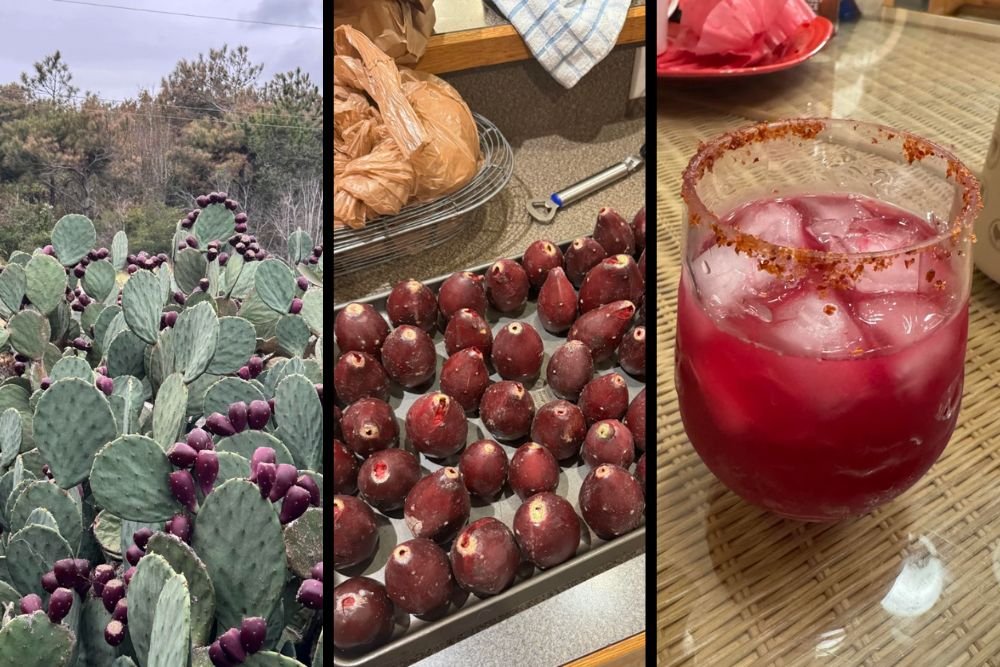Tourists in North Carolina Say They Got Sick After Making Margaritas From Foraged Prickly Pears
NORTH CAROLINA — A group of friends vacationing in North Carolina say they became severely ill after foraging ripe prickly pears by the roadside and using them to make homemade margaritas. The experience left three of the four individuals with intense headaches, nausea, and body aches — prompting questions about whether the cactus fruit was contaminated.
A Foraging Adventure Gone Wrong
The group said they spotted what appeared to be a large patch of ripe prickly pears growing near a road and decided to harvest them for a fun culinary experiment. “We saw a ton of ripe prickly pears by the side of the road. We decided it would be fun to juice them and make prickly pear margaritas,” one person wrote online.
They explained that they carefully removed the spines by burning them off and then boiled the fruit for about 20 minutes before juicing it using a strainer and coffee filters. “Honestly they didn’t taste like much but had a beautiful color — the juice definitely had a beet-like, root-vegetable flavor,” the post said.
But by early the next morning, several of them began experiencing alarming symptoms.
Severe Symptoms Hours After Drinking the Juice
“Three of the four of us ended up having really awful symptoms around 6 a.m.,” the poster wrote. “We were waking up every hour with headaches, body aches, skin sensitivity, and feverish chills. One of us threw up and is still nauseous.”
The group described their symptoms as consistent with foodborne illness or toxic exposure. They emphasized that the fruit had been boiled and filtered — leading them to wonder whether pesticides, herbicides, or vehicle exhaust contamination from nearby traffic could have caused the sickness.
Experts Warn Against Roadside Foraging
While prickly pears (from the Opuntia cactus family) are commonly eaten in the American Southwest and Southern states, experts say that roadside foraging carries serious health risks. Plants growing close to highways often absorb heavy metals, petroleum residues, and other pollutants from car exhaust or chemical runoff.
According to North Carolina Cooperative Extension, wild edibles collected near roads can also accumulate lead, cadmium, and hydrocarbons, which can lead to gastrointestinal distress and flu-like symptoms when consumed in significant amounts.
Dr. Amanda Beech, a toxicology specialist at Duke University Hospital, told regional news outlets in a past case that “even a small amount of exhaust-contaminated or pesticide-treated plant matter can cause acute symptoms — nausea, headaches, or mild poisoning — within hours.”
Got sick from foraged prickly pears 🙁
byu/chasingthestarfish inforaging
Prickly Pears Can Also Cause Natural Reactions
Beyond environmental contamination, prickly pears themselves can trigger adverse reactions if not prepared properly. The tiny hair-like spines called glochids can remain on the fruit even after burning or scrubbing and may cause irritation of the throat, stomach, and intestines if ingested.
Additionally, certain compounds in cactus fruit can act as natural laxatives or diuretics, sometimes leading to dehydration, dizziness, or nausea — especially if eaten on an empty stomach or in large amounts.
The Group Still Recovering — and Warning Others
While all four vacationers have since recovered, they shared their experience to warn others about the dangers of consuming wild plants without knowing their exact source. “It could be the fruit, or maybe road contaminants — we just didn’t expect to get this sick from something that grows so freely,” they wrote.
Public health officials encourage anyone who experiences severe vomiting, fever, or persistent symptoms after eating wild plants or fruit to seek medical care immediately.
Have you ever had a bad experience with foraged foods or wild fruit in the Carolinas? Share your story and join the conversation at SaludaStandard-Sentinel.com.







